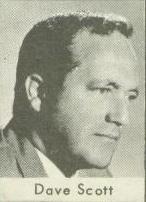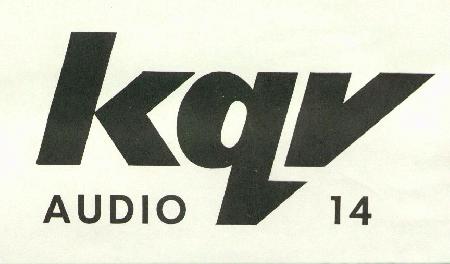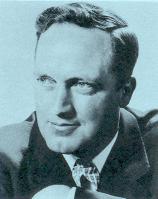 |

Dave Scott |
 |
 |

Dave Scott |
 |
| Here is the text of KQV article in "The Coca-Cola Bottler" Magazine from August 1966. |
|
A crowd of teen-agers gathered outside of Radio Station KQV studios on
busy 7th Avenue in Pittsburgh, Pa., and stared with fascination through
a large plate-glass window at the smiling disc jockey spinning records
inside.
As a song with rock-'n'-roll rhythm was belted out through an oustide loudspeaker, some of the lanky boys on the sidewalk marked the go-go beat of the music with deliberate body movements. "Man, that's soul music!" exulted the 15-year-old David Dobies, a high school freshman. "There's something about it that gets you. When you hear it, you've got to dance. You've just got to shake!" David's 17-year-old brother, Frank, and 17-year-old Bob Fowler agreed that KQV plays "the sharpest and maddest rock music in town." Between two of the "groovy" hit numbers, a top recording artist sang the jingle, "Things Go Better with Coke," as part of a commercial for Coca-Cola - and many of the teen-agers sang or hummed the tune, too. KQV Disc Jockey Dave Scott, who has almost a monopoly on teen-age listeners in the Pittsburgh area, is a 44-year-old broadcasting veteran known as "Pittsburgh's oldest teen-ager." While he plays the top-hit records of the day, in full view of the passing throng, "The Great" Scott frequently drinks Coke and ad-libs: "Coca-Cola is the greatest ... I'm drinking a bottle of Coke right now." All over the Pittsburgh area, teen-agers tune in to KQV to hear their music - the swinging kind that "squares" of older generations may not dig. Man of the boys and girls carry portable radios so that they can keep up with the "tops in pops" wherever they are. It was to reach this important Youth Market that a heavy advertising schedule for Coca-Cola was initiated on KQV about a year and a half ago. Since that time, there have been 60 spots for Coca-Cola - all 60 seconds in length - on the station each week. There are eight advertising messages for Coca-Cola on KQV each Monday through Friday, between 3 and 6:30 p.m. when Dave Scott is spinning the platters. In addition there are 10 spots for Coke on the station between noon and 6 p.m. each Saturday and Sunday. "In the past, we had not treated the Youth Market as a specific market segment," said John F. Blizer Jr., vice president and general manager of Quaker State Coca-Cola Botting Company in Pittsburgh. "In evaluating our opportunities for growth, we concluded that the Youth Market was the single most significant segment for immediate as well as future gains. "From our point of view, we are delighted with the results of our radio advertising directed at the Outh Market. The on-premise sales of Coca-Cola at teen hangouts in our area have substantially increased. We view the effort in conjunction with KQV as a major contributor in developing an area that was previously underdeveloped." Negotiations with radio stations in Pittsburgh to determine the most effective way to reach the most young people with our commercials for Coca-Cola were handled by the McCann Bottler Service Group, with headquarters in Cleveland, Ohio. Dave Baylor, regional account executive for the McCann Bottler Service Group, and Miss Kim Smarsley, regional media buyer, contacted radio stations in the area to find out what they had to offer. Edwin L. Lubin, account executive for KQV, pointed out that surveys show that KQV reaches more teen-agers than all other stations in the city combined. "Our broadcasts are heard by teen-agers everywhere," he said, "at home, in cars, at lakes, swimming pools, nearby beaches, pizza places, and dancing parties. Our music is very appropriate for dancing - the frug, monkey, watusi, jerk or whatever the latest dance craze happens to be." Garrett Blanchfield, promotion director for KQV, said a Trendex survey was conducted in Pittsburgh and teen-agers were asked: "Which of the stations you listened to at least once during the past week is your favorite?" Of those in the 13-17 age group, 71.7 percent replied "KQV." The second-ranking "favorite" station was named by only 5.4 percent of those in this age group. Mr. Lubin and Mr. Blanchfield are part of an aggressive young teem of executivs who work for KQV, which is owned by the American Broadcasting Company. John Gibbs is vice president and general manager of the station. Other executives are John Rook, operations director, and John Tenaglia, general sales manager. KQV plans all its programming with teen-agers and young adults up to 35 years of age as the "target audience." However many older people also listen to the station's music and news broadcasts. Listeners tune in on KQV to hear the official "Finest Forty" - the 40 most popular songs as selected each week by the station on the basis of record sales at leading outlets, requets and other sources. KQV, which became a "top 40" station in 1958, distributes each week leaflets listing the "Finest Forty" at major record outlets in the city. During the "peak traffic" period each day, from 6 to 6:30 p.m., the top five tunes are presented along with commercials for Coca-Cola. Each of the top five records - "The Top Five Brought to You by Your Coca-Cola Bottler" - is fanfared, and the "Things Go Better" jingle is played preceding the hit disc. The Disc Jockey Scott says, "Here's No. 2!" or "Here's No. 1." Listeners are invited to send in postcards for a drawing to select a daily winner of the top five records. Each day between the No. 2 and No. 1 songs, a postcard is drawn - and "The Great" Scott announces the winner. More than 8,300 postcards have been received during the past year. The Quaker State Coca-Cola Bottling Company in Pittsburgh bought 500 copies of the Billy Vaughn recording of "Things Go Better." District managers and salesmen distributed 100 of these among top dealers, and the other 400 were distributed by Station KQV. Mr. Scott played the record on his program and then said, "Hey, if you'd like a free copy of this, just drop a note to me." All the records were gone within three days. On one occasion, Station KQV offered 200 records featuring various versions of the "Things Go Better" jingle to the first 200 people requesting them. More than 200 requests were received in one day. The station and Scott frequently get letters from young listeners asking such questions as, "Can I get a record of the Supremes singing the 'Things Go Better with Coke'?" Dave - "The Great" - Scott, a man fast with a record and a quip, has am emphatic, gravelly voice and an outgoing personality that teen-agers like. He is frequently asked to spin records for high school dances and other teen-age parties. As the father of two teen-age boys, he speaks the language of the younger generation. What's more, he really likes the rock music - and the Beatles! Dave Scott's son, Greg, a freshman at Point Park College in Pittsburgh, is already a part-time disc jocket for KQV. He spins platters from 3 to 8 p.m. every Sunday - and there are a number of spots for Coca-Cola during his weekly broadcasting stint. KQV has a regular staff of five disc jockeys known as "the fun-loving five." Besides Dave Scott, the "jocks" are Steve Rizen, Hal Murray, Chuck Brinkman and Tom Lee. "We often fill requests," Mr. Scott said, "but we don't announce the names of people requesting these songs. Announcing names and dedications would mean more talking and less music. We believe in giving our listeners what they want to hear - and that is pop music!" Richard D. Harvey, vice president of The Coca-Cola Company and Brand Manager for Coca-Cola, said Pittsburgh is "one of many places where the segmented advertising approach using youth radio personalities has been well received." "Our campaign using popular recording artists was named one of the country's top five radio advertising campaigns by Printer's Ink magazine," Mr. Harvey pointed out. "It also was named one of the top 10 radio campaigns by the Radio Advertising Bureau. "Since the inception of this campaign, more than 40 recording stars - including four or five new groups each quarter - have recorded the 'Things Go Better' jingle for our radio commercials. Current personalities indlude the Supremes, Ray Charles, Nancy Sinatra, Gary Lewis and the Playboys and three English groups - 'The Seekers,' 'The Moody Blues' and 'The Fortunes.' "The end result of this is that through our advertising we are young and alive - rather than just telling people we are." |